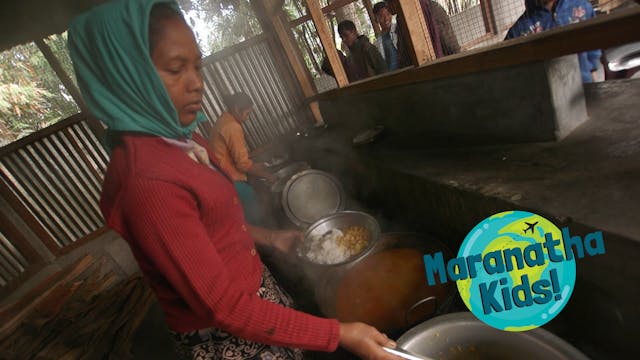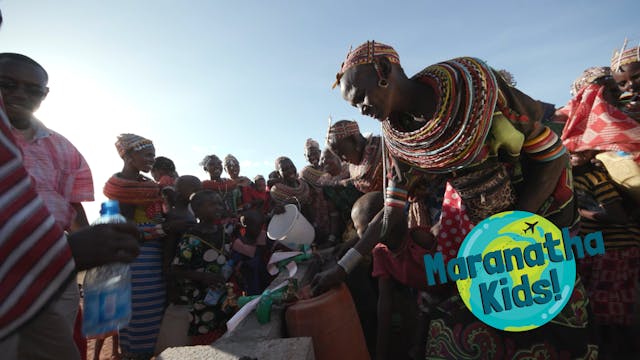Water From the Sand
Maranatha Kids
•
16-Dec-2021
This week, we’re inviting you to read this story (BELOW ⬇️) to your kids about one girl’s daily struggle for water, and how Maranatha helped. Then watch the above video of her collecting dirty water from a dry riverbed in Kenya. We hope it inspires your children to consider their own water situation and how God’s love for all of us never fails.
-------
Chuor is an 11-year old girl in Kenya who belongs to the Daasanach (“Dahsanich”) tribe. The Daasanach people have lived in much the same way as their ancestors have for generations. They usually don’t see many people outside of their tribe. They have their own language and songs. Their homes are small huts made of wood or metal sheets. They take care of animals like goats, sheep, and cows. Chuor, as well as the other girls and women, have a similar hairstyle—rows of short braids in the back and even shorter braids in the front that are dyed a reddish color.
Chuor lives in a village named Watalii. It is very hot in Watalii, around 100 degrees Fahrenheit. It’s very windy too. There are no stores or markets nearby—the Daasanach people have to make the things they need from whatever materials they can find. They also have to find their own food. Living here can be very challenging, but the hardest part is that Chuor and the rest of her village have no water.
It rarely rains here, so one of the only places they can find water is by digging down into a dry riverbed of sand to see if water seeps up. The water they do find is muddy, but it is the only option they have. Sometimes there is no water to be found at all in the riverbed. When that happens, the people have to walk for hours to a salty lake. They really can’t drink the water because it’s too salty, but they will use it for other things and drink a little bit if they have to.
Each day, Chuor walks from her village to the dry riverbed with her older cousin, Dhawo. Crunch, crunch, crunch. The girls walk through the dirt, sand, and small thorny shrubs that lie on the ground. The kids in Watalii don’t wear shoes, but their feet are so tough that they don’t feel the pokey thorns and sharp rocks. Chuor and Dhawo carry yellow jugs called jerry cans. The walk takes about 10-15 minutes, and on the way there, the walk is not too difficult because the cans are empty. But on the way back home, those cans will be heavy, making the walk harder.
When the girls reach the hole that their village has dug, they work as a team with other ladies, helping them to pull the heavy cans out of the deep hole. Then Dhawo climbs down a tree branch that has been placed there as a ladder, and splashes down into the water. Some of these holes have small pools of water, but others require the ladies to dig through sand each time they come to get water. Luckily for Dhawo, this hole has water, but unfortunately it is very dirty. It can make the girls sick with a stomach ache or a headache, but they must have some water to drink, cook food with, and clean themselves with, so they use it.
After they have filled their jerry cans and lifted them out of the hole, they start the walk back home. Some ladies place a rag on their head for the can to sit on as they walk. That much weight on their heads can make their neck sore, but the walk is too far to carry the cans with their arms. When they get home, the girls may use the water for drinking, washing dishes, or cleaning. Every day the girls must make this trip, sometimes more than once.
Maranatha heard about the Daasanach people and their problem with water, and wanted to help. The only problem was that Watalii and other Daasanach villages are very far away from where Maranatha’s team is located near the capital city of Nairobi. It would take our well drilling rig five days to drive there, and half of that journey would be through stretches of desert where there are no roads. What if the Maranatha crew got lost? What if one of their trucks broke down? There are no towns or repair shops for them to stop at. They would also need to bring all of their own gas, food, and supplies to make it to Watalii and back home. Maranatha prayed and thought a lot about the details of making the trip to Chour’s village, and finally in November 2021, Maranatha arrived in Watalii.
An expert used equipment to look for water under the ground and found a spot near the church Maranatha had built for Watalii. The crew began drilling on a Tuesday afternoon. The drilling rig roared as the drill grinded through the sandy soil, spraying dust everywhere. After only a couple of hours, the crew found water! But because the ground in Watalii is so sandy, the hole they drilled was not strong, so it began to break up! They were afraid they might lose the hole, so they tried to put a big pipe called “casing” into the hole so it would be strong. They worked into the evening to save the hole, but it didn’t work. Maranatha’s team was very disappointed. They sweated in the hot sun all day to hit water, and they were sad they didn’t find it for the village.
After praying about the situation,they made the decision to drill another hole about 100 feet away the next day. The drilling took all day because they went very slow so that the hole wouldn’t collapse. Finally, at 9 p.m. they stopped, without any sign of water. It was disappointing, but the crew thought that if they waited overnight, the hole might slowly fill with water.
In the morning on Thursday they flushed the hole by shooting air down, and they could see water spraying out! But would there be enough water to pump it out through a pipe? They put in casing to keep the hole strong and waited overnight for the water to rise. The next morning, they could see that there was a bit of water, but not quite enough to pump out. They put in the casing and waited some more, hopeful that the water would rise. Then, on Friday, they found enough water for Watalii to have a well! There was lots of excitement, yelling, and celebrating..
Just a couple of days later, Maranatha leaders came to dedicate the new well for Watalii. Chuor had a smile on her face throughout the day as she looked at her village’s new water well—it was all finished, complete with a concrete base and a hand pump. She thought about all of the years she had spent collecting water in the riverbed. She wouldn’t have to make that walk anymore. No more heavy jugs of water. No more muddy water. Just clean, clear water right next to her house. She was thankful to God and Maranatha for this gift. Chuor and the rest of the village sang a song of praise as they celebrated this huge change for Watalii.
Watch Chuor make her daily walk to the dry riverbed to collect water.
Discussion Questions
- What is the hottest place you’ve ever been to? How much water did you drink while you were there?
- Having clean water right in her village was a big change for Chuor—what is the biggest change you’ve seen in your life? How did it make you feel?
- There are lots of big changes that we experience in our lives, but one thing that doesn’t change is God’s love for us. Psalm 33:11 says, “The counsel of the Lord stands forever. The plans of His heart from generation to generation.” God has loved the Daasanach people for generations, and His love for you never stops either, no matter the changes that might come. Why do you think this is?
Prayer Points
- Thank you for always loving us no matter the changes that happen.
- Ask kids what they would add to the prayer list.
Did You Know?
- The village of Watalii is only miles from the border of the country of Ethiopia, and there are many Daasanach people who live there as well.
- Maranatha drilled five other wells in this part of Kenya before heading home after a month in the field.
Up Next in Maranatha Kids
-
Waiting on Hope
This week, we’ll meet members of the very first Hispanic Seventh-day Adventist Church in North America: the Tucson Central Church in Arizona. For many years, this faith group bounced from rented space to rented space, and every time they moved, they lost some of their members. They just had to fi...
-
Cooking with Dirty Water
This week, we’re looking at the different types of food found in the country of India. Your kids will see the markets where people buy their food, and learn about common meal components like curries. They’ll also consider how cooking might be difficult without clean water, which is a predicament ...
-
#GivingTuesday 2021 for Maranatha Kids!
This week, we want to share something special that Maranatha is participating in called #GivingTuesday. Each year on the Tuesday after Thanksgiving, people give to a cause that is close to their heart. This year in 2021, #GivingTuesday is on November 30, and Maranatha is working to raise $210,000...


